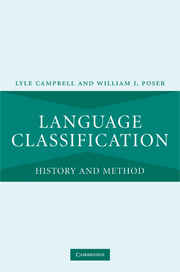Book contents
- Frontmatter
- Contents
- List of figures, tables, and charts
- Acknowledgments
- Preface
- 1 Introduction: how are languages shown to be related to one another?
- 2 The beginning of comparative linguistics
- 3 “Asiatic Jones, Oriental Jones”: Sir William Jones’ role in the raise of comparative linguistics
- 4 Consolidation of comparative linguistics
- 5 How some languages were shown to belong to Indo-European
- 6 Comparative linguistics of other language families and regions
- 7 How to show languages are related: the methods
- 8 The philosophical–psychological– typological–evolutionary approach to language relationships
- 9 Assessment of proposed distant genetic relationships
- 10 Beyond the comparative method?
- 11 Why and how do languages diversify and spread?
- 12 What can we learn about the earliest human language by comparing languages known today?
- 13 Conclusions: anticipating the future
- Appendix: Hypothesized distant genetic relationships
- References
- Index
9 - Assessment of proposed distant genetic relationships
Published online by Cambridge University Press: 22 September 2009
- Frontmatter
- Contents
- List of figures, tables, and charts
- Acknowledgments
- Preface
- 1 Introduction: how are languages shown to be related to one another?
- 2 The beginning of comparative linguistics
- 3 “Asiatic Jones, Oriental Jones”: Sir William Jones’ role in the raise of comparative linguistics
- 4 Consolidation of comparative linguistics
- 5 How some languages were shown to belong to Indo-European
- 6 Comparative linguistics of other language families and regions
- 7 How to show languages are related: the methods
- 8 The philosophical–psychological– typological–evolutionary approach to language relationships
- 9 Assessment of proposed distant genetic relationships
- 10 Beyond the comparative method?
- 11 Why and how do languages diversify and spread?
- 12 What can we learn about the earliest human language by comparing languages known today?
- 13 Conclusions: anticipating the future
- Appendix: Hypothesized distant genetic relationships
- References
- Index
Summary
The difficulty of the task of trying to make every language fit into a genetic classification has led certain eminent linguists to deprive the principle of such classification of its precision and its rigor or to apply it in an imprecise manner.
(Antoine Meillet 1948[1914]:78)Introduction
Throughout this book, we have concentrated on methodological considerations which need to be taken into account in attempts to determine family relationships among languages, and we have looked at successful cases where it has been possible to demonstrate that languages are related and thus to establish different language families (Chapters 4, 5, and 7). In this chapter the goal is to examine several of the best-known hypotheses of long-range relationships, so-called “macro-families” – proposed distant genetic relationships where it has not yet proven possible to demonstrate convincingly the postulated relationship among the languages. These include Altaic, Ural-Altaic, Nostratic, Eurasiatic, Amerind, Na-Dene, proposed Dravidian external connections, and Indo-Pacific. (Some contested proposals in Africa, Australia, and the Americas were considered in Chapter 6, and Proto-World is considered in Chapter 12.) We concentrate here on methodological principles. Our intent in this chapter is to try to explain why these hypotheses of remote linguistic kinship remain in doubt and why most historical linguists do not accept them. These case studies should contribute to clarifying the methods and procedures employed in the investigation of distant genetic relationships and what it takes to support a case for linguistic kinship.
Information
- Type
- Chapter
- Information
- Language ClassificationHistory and Method, pp. 234 - 296Publisher: Cambridge University PressPrint publication year: 2008
